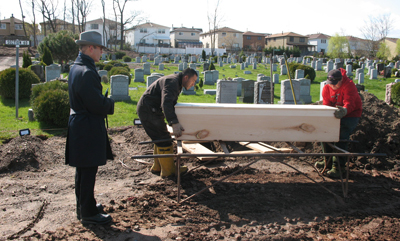
(RNS1-APR28) Rabbi Shmuel Plafker, left, of the Hebrew Free Burial Association recites blessings on the pine coffin of Leonard Horowitz at the Mount Richmond Cemetery on Staten Island, N.Y. Plafker’s group paid for the funeral when Horowitz died without any money or survivors. Plafker said requests for the group’s services are up even as the economic downturn impacts donations and investments. For use with RNS-ECON-FUNERALS, transmitted April 28, 2009. Religion News Service photo by Nicole Neroulias.
NEW YORK — When Leonard Horowitz died at Putnam Hospital recently (April 20), the 92-year-old developmentally disabled man left behind no family, no friends, no savings and no final requests.
Nevertheless, Horowitz was buried with full Jewish rites at Staten Island’s Mount Richmond Cemetery, where Rabbi Shmuel Plafker recited blessings as two workers lowered Horowitz’s plain pine casket into the muddy ground.
The brief ceremony, which concluded within 20 minutes and with Plafker the only mourner present, was the second of the morning for the Hebrew Free Burial Association, a nonprofit organization founded in 1888 to provide funerals for underprivileged Jews.
The financial downturn has contributed to a jump in requests for the association’s services in the past four months, officials said, while donations and investment income have dropped about 15 percent since last year.
“Regardless of the socioeconomic situation, our mission is to see that a Jew should be buried properly,” said Plafker, the association’s cemetery chaplain. “In Judaism, the ultimate kindness is to take care of the dead.”
The average cost of an American funeral — estimated at $7,323 by the National Funeral Directors Association — can break the bank for struggling families, even more so during a recession. The association reported grim figures for 2008, as clients increasingly opt for more affordable alternatives to stretch limousines, mahogany coffins and sit-down dinners.
Yet some funeral homes that cater to traditional religious communities have reported lesser declines, presumably due to strict codes for honoring the dead that apply in boom and bust times alike.
For example, while the NFDA reported a 78 percent jump from 2007 to 2008 for requests for cremation — which is generally several thousand dollars cheaper than a burial — that option is forbidden for devout Jews, Muslims, Orthodox Christians, Mormons and others.
“The economy is going to have an impact on what people do with their dead, but even in down times, people want to do right by their dead,” explained Gary Laderman, an expert on American death rituals at Emory University. “It’s one of the fundamental duties of the living to make sure you take care of the dead in the proper ritual way. There’s a great deal at stake for these communities, in terms of your relationship with God in the afterlife.”
On a larger scale, faith leaders across the country have led efforts against government cuts to hospital morgues and coroner services. In New York, where city officials are grappling with an estimated $16 billion deficit, Jews and Muslims joined forces this spring to prevent budget cuts that would have forced medical examiners to lay off staff and close offices.
New York City Councilman Simcha Felder, an Orthodox Jew who represents part of Brooklyn, said his phone was ringing off the hook as word spread about the proposed cuts. Traditional Jews and Muslims need expedited burials, he explained to his colleagues at the city and state level, and cuts to the medical examiner’s office would cause unacceptable delays in bodies being released to funeral homes.
“It was a very grave concern,” he said, no pun intended, after the issue was resolved in mid-April. “There’s a priority on burying the dead as soon as you can.”
Other regions have had to accept such cuts, however. In Utah, reduced funding for the state medical examiner’s office has prompted Shaun Myers, owner of Myers Mortuary in Ogden, to advise grieving families to expect funeral delays. Fortunately, he said, most of his business has been immune to the economic downturn so far, partly because many of the deceased — predominantly elderly Mormons — had prepared for their simple funerals decades in advance.
“Older people tend to have prearranged funeral plans, with money set aside, because they lived through the Depression,” he said. “Some families may be more conservative in selecting a less expensive casket, but we haven’t seen a significant change otherwise.”
Most religious death rituals are supposed to emphasize humility, Laderman said, despite the pricey caskets and fancy feasts offered by the funeral industry. Mormons typically focus on providing for a large family gathering, Myers said, but the scale of the venue, refreshments and other aspects are negotiable and may be covered by the Church of Jesus Christ of Latter-day Saints.
Jews and Muslims also need not go into debt for burial expenses, with both faiths requiring only that the dead be buried in a simple white shroud, explained Leor Halevi, professor at Vanderbilt University and author of “Muhammad’s Grave: Death Rites and the Making of Islamic Society.”
“It’s supposed to be relatively economical, and to some degree, the economic downturn presents an opportunity to try to give these rituals more meaning,” he said. “People have to watch their money more carefully, they have to make more active decisions that may end up being more meaningful and more involved in burying the dead.”
(OPTIONAL TRIM FOLLOWS)
While funeral directors may have well-placed concerns about Americans opting for less expensive services and products, Laderman predicts that traditional faith communities aren’t likely to embrace drastic cost-cutting measures anytime soon.
“It would take things getting a lot, lot worse,” he said, “to see religious people start to change their rituals dramatically.”




